Key takeaways:
- Community accountability fosters trust and encourages collective responsibility for actions, benefiting individual growth and community well-being.
- Pro-life advocacy relies on individual involvement and shared stories to raise awareness and support for mothers and unborn children.
- Effective accountability mechanisms include local groups, online discussions, and community events that promote collaboration and knowledge-sharing.
- Regular feedback, clear success metrics, and collaborative projects enhance accountability and inspire community members to take action together.
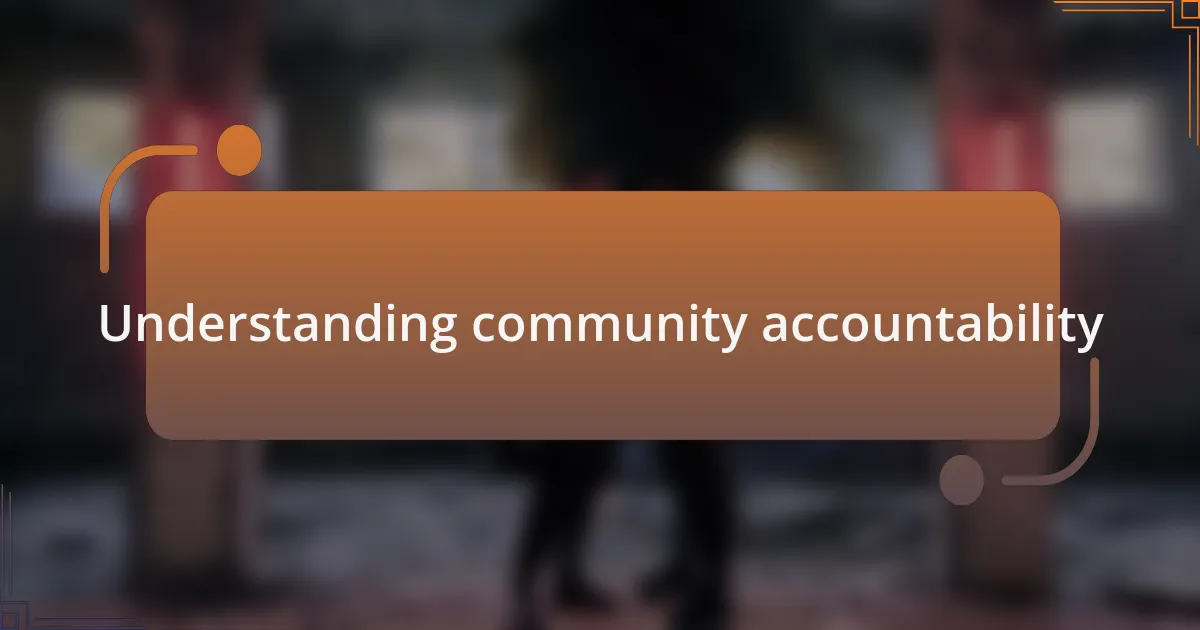
Understanding community accountability
Community accountability is fundamentally about holding each other responsible for our actions and decisions, creating a supportive environment where values are shared and upheld. I remember a time in my own community when we faced a critical decision about a local initiative. Through open discussions, we collectively examined the implications of our choices, which taught me the power of being answerable to one another.
In my experience, this accountability goes beyond just establishing rules; it’s about nurturing trust. Have you ever felt the weight of expectations from those around you? I have. When I knew my neighbors were watching, it motivated me to engage more meaningfully – whether it was volunteering or speaking out against injustices. That’s the essence of community accountability: encouraging each other to strive for the greater good.
Moreover, effective accountability must be approached with empathy and understanding. We all make mistakes; I’ve certainly had my share of missteps. In those moments, the support and feedback from others helped me grow. It emphasizes that being accountable is not merely about punishment but rather about fostering an environment where everyone feels valued and motivated to improve. How can we encourage this culture in our own communities? By modeling compassion and open dialogue, we can create spaces where accountability flourishes.
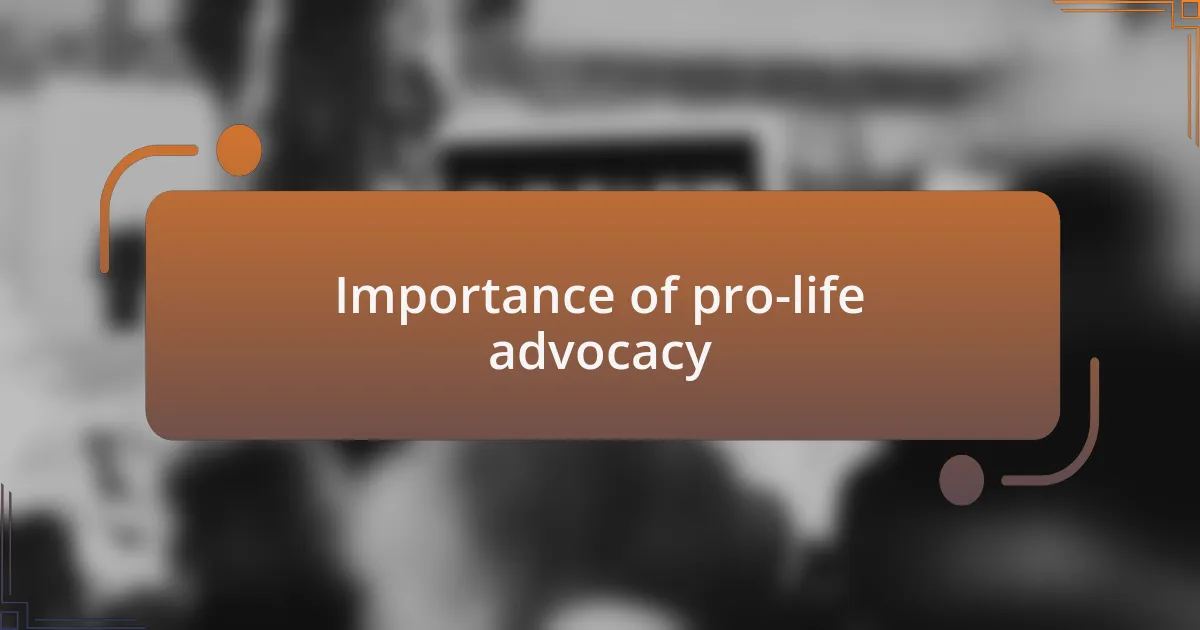
Importance of pro-life advocacy
Pro-life advocacy is essential because it positions the value of life at the forefront of our societal conversations. When I attended a local pro-life rally, I felt an overwhelming sense of unity among people who shared the same belief that every human life deserves protection. This collective voice amplifies our message, creating awareness and fostering action within the community.
Raising awareness about the significance of life can make a profound difference. I recall speaking to a friend who was uncertain about her views on pregnancy and choice. Through our conversation, I noticed how sharing facts and personal stories about the impact of pro-life advocacy opened her eyes to new perspectives. Engaging others in dialogue like this is more than just sharing a viewpoint; it’s about creating a ripple effect that can shape hearts and minds.
Moreover, pro-life advocacy encourages a culture of support for both mothers and unborn children. In my own experience, I’ve seen how organizations that promote the pro-life message also provide resources for expectant mothers in need. Isn’t it inspiring to witness a movement that offers love and practical help? I believe that by working together, we can build a future where every life is valued and supported, allowing families to flourish.
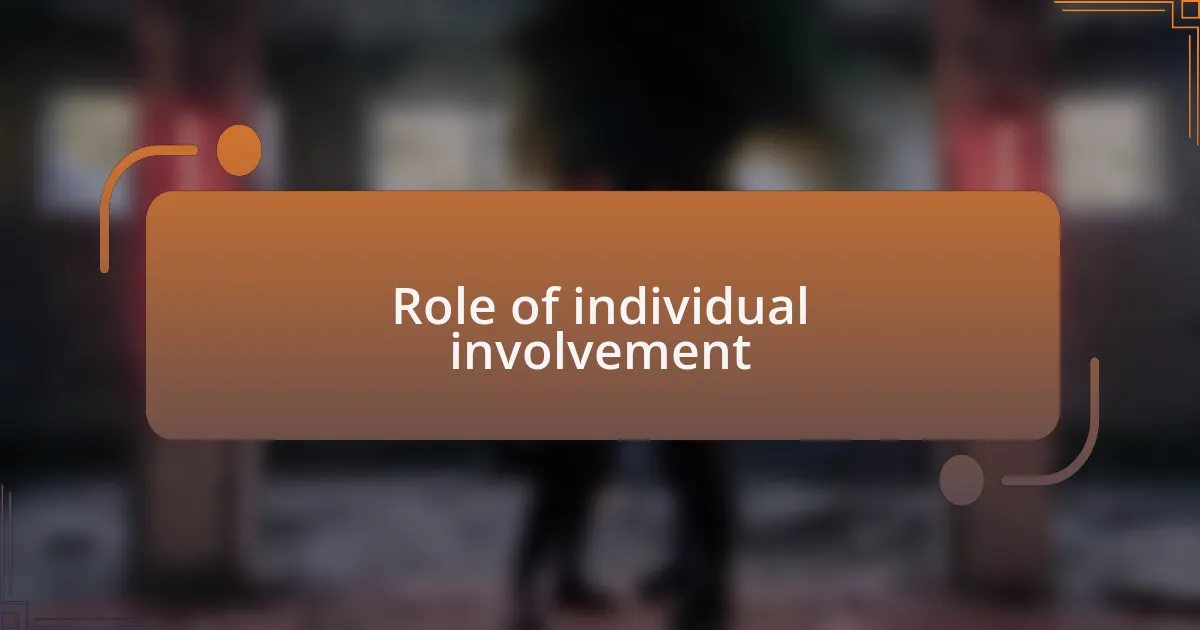
Role of individual involvement
Individual involvement is crucial in pro-life advocacy, as it empowers each person to contribute to the cause in meaningful ways. I remember volunteering to help out at a local pregnancy resource center, where I met incredible women navigating difficult circumstances. It was eye-opening to see how a single act of support could change someone’s outlook on life and elevate their confidence in choosing life for their unborn child.
When I think about individual contributions, I’m reminded of the letters I received from people I engaged with during community events. Each letter contained heartfelt stories of transformation, showing that one person sharing their experience can inspire a whole community. Every conversation matters—whether it’s discussing the impact of pro-life initiatives in a casual setting or engaging in passionate debates on social media. Isn’t it amazing how a single voice can resonate beyond its immediate surroundings?
My personal journey reflects that every effort, no matter how small, can create ripples within the broader pro-life movement. I’ve often found myself encouraging friends to become advocates, whether through social media or at local gatherings, and it’s rewarding to see them develop their own relationships with the cause. This collective effort can forge connections that not only elevate the pro-life message but also strengthen our community bonds, reminding us that together, we can be agents of change.
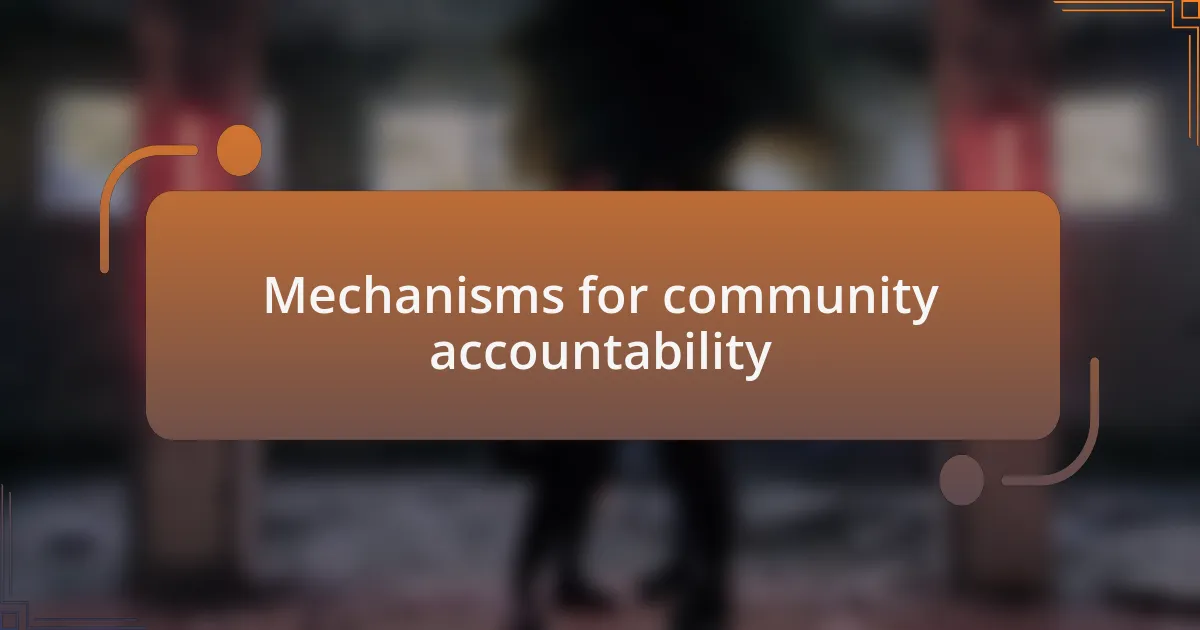
Mechanisms for community accountability
Community accountability is essential for creating a supportive environment where pro-life initiatives can thrive. One effective mechanism I’ve witnessed is the establishment of local accountability groups. These groups gather regularly to assess the impact of their advocacy work and share experiences. I remember sitting in on one of these meetings, where a member shared how their outreach efforts had transformed a young woman’s situation. Hearing this firsthand made me realize how collective feedback and shared goals can enhance our strategies and ultimately foster a united front.
Another powerful tool for accountability lies in social media and online forums. These platforms allow advocates to share their successes and challenges transparently. I often find encouragement in the comments section of my posts, where fellow advocates not only cheer each other on but also provide constructive criticism. Have you ever considered how online discussions can elevate our collective understanding? Engaging in these dialogues not only builds trust but encourages us to hold ourselves and each other to a higher standard in fulfilling our pro-life commitments.
Lastly, organizing community events like workshops or discussions creates spaces for accountability and education. I recall attending a workshop focusing on effective communication strategies in pro-life advocacy. Participants were invited to share their own approaches, fostering a sense of collaboration. It struck me how such gatherings empower not just individual growth, but the whole community’s resolve. Isn’t it rewarding to see how knowledge-sharing can strengthen both our conviction and our ability to inspire action?
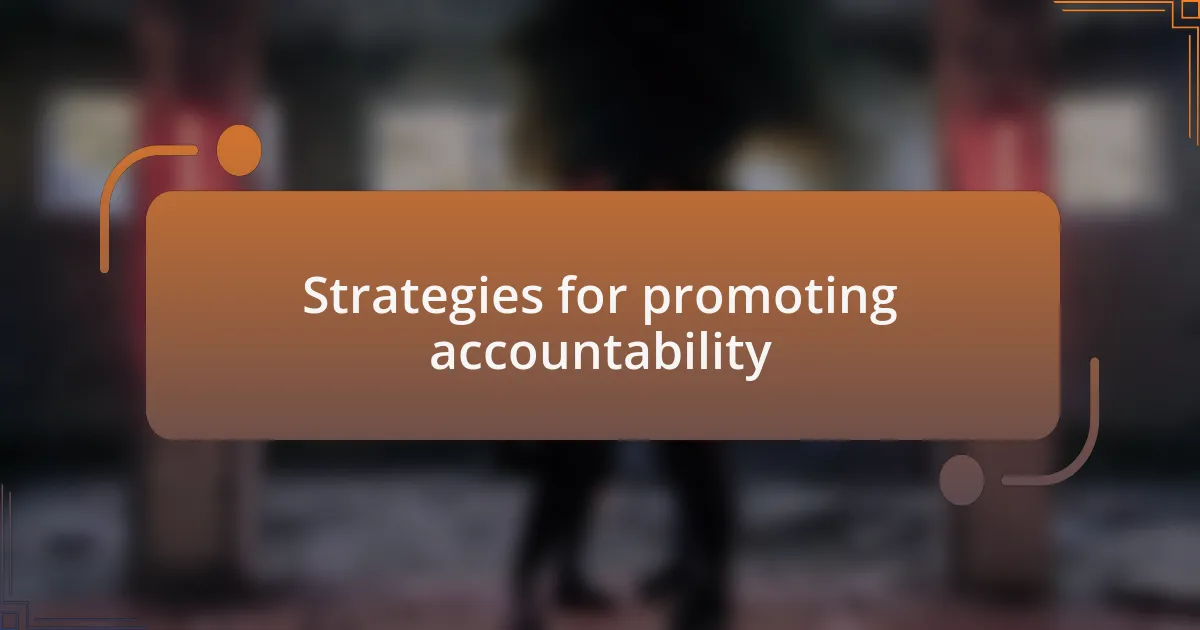
Strategies for promoting accountability
One effective strategy I’ve found is implementing regular feedback loops within community groups. During a recent encounter, a fellow advocate shared how they initiated weekly check-ins, where members could voice their challenges and celebrate their wins. This simple practice transformed our dynamic; it not only elevated accountability but also fostered a deeper sense of belonging. Have you ever noticed how accountability can thrive when we feel truly seen and heard?
Another approach I believe is impactful involves creating clear metrics for success. Recently, our group developed a set of goals with specific, measurable targets. We celebrated small milestones together, which made the larger objectives feel achievable. It was uplifting to see how this clarity inspired everyone to step up as leaders in their roles. How often do we overlook the power of clear expectations in fostering a culture of accountability?
Finally, I’ve experienced great success through collaborative projects. In one initiative, we teamed up with a local charity to run a fundraiser, engaging community members while raising awareness. This not only showcased our commitment but also invited others to join us in holding each other accountable. It reinforced my belief that when we work together towards common goals, we create a ripple effect of responsibility and integrity within our community. Have you considered how collaboration could enhance your own accountability efforts?
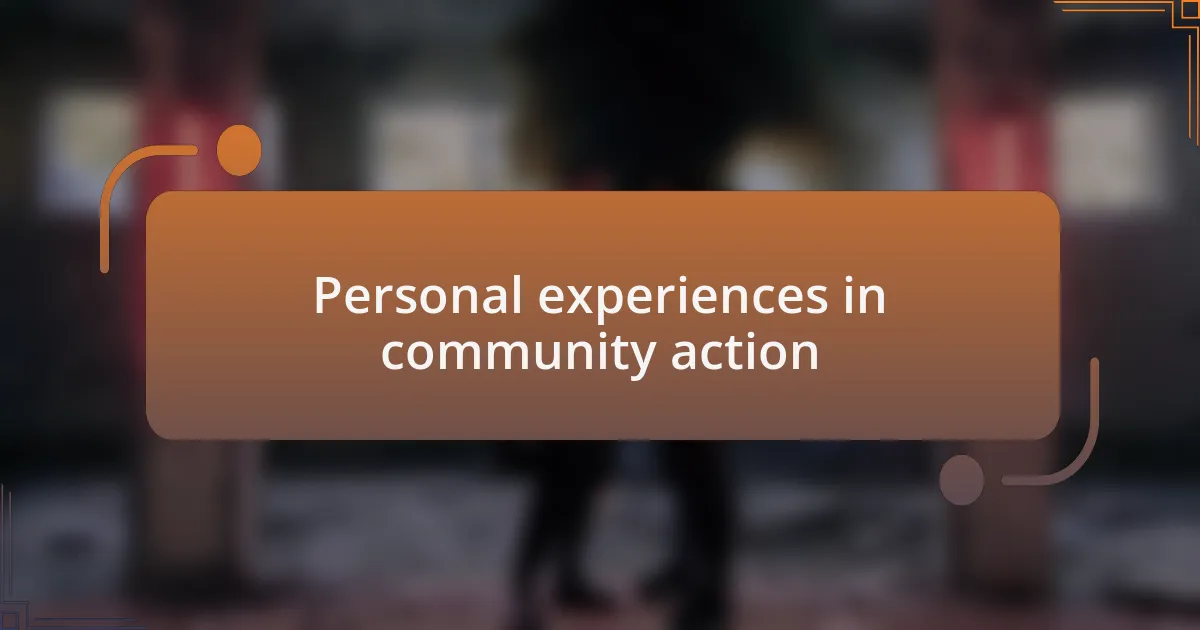
Personal experiences in community action
I vividly remember my first experience volunteering at a community outreach event. I arrived eager but nervous, unsure of how to contribute. As the day unfolded, I witnessed firsthand the power of people coming together for a common purpose. I quickly realized that each person had a role, and it was uplifting to see how our collective efforts made a tangible impact. Have you ever felt that surge of energy when working alongside others who share your vision?
In a different instance, I was part of a neighborhood cleanup initiative that came together surprisingly quickly. At first, there were just a handful of us picking up litter, but as we went along, passersby began to join in. It was heartwarming to see how one small act of community action could inspire others to participate. I learned that sometimes all it takes is the courage to step forward; you never know who might be waiting for an opportunity to get involved. Isn’t it fascinating how a simple invitation can ignite a sense of shared responsibility?
Reflecting on my journey, a significant moment was leading a workshop on the importance of community accountability. It was a small group, but the conversation flowed naturally as we shared our experiences and insights. I could feel the weight of unspoken struggles lift as participants felt comfortable enough to share their pitfalls and successes. This openness made me recognize that accountability isn’t just about meeting goals; it’s about the relationships we build and the mutual support we offer one another. Do you remember a time when opening up about challenges helped strengthen connections in your community?